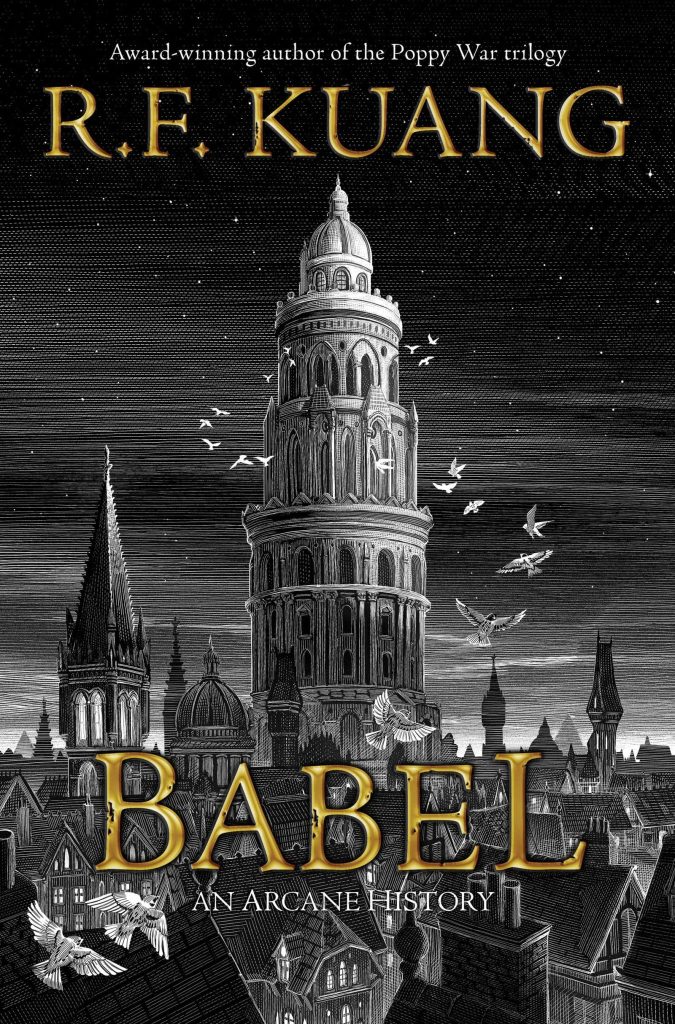Yesterday, I finished reading (or should I say listening to) Babel by R F Kuang. The book actually has a longish title- Babel: Or the Necessity of Violence: An Arcane History of the Oxford Translators’ Revolution.

The longish title reminds us of the titles of Victorian novels and that is intentional as the book itself is set in an alternate version of 1830s Britain where Industrial revolution is in full swing but the changes driving society are not just powered by steam but by magic. And what a magic this is. Kuang’s alternate history is driven by magical silver bars that contain “match pairs” of words in different languages that have similar meanings but not the same. The effect of the magic is the difference is driven by the difference in meaning between the two words and this is where the translators come in. For the magic to truly work, you need people who can completely inhabit two or more languages. Complicated? It is and that is also completely intentional.
This might be a work of fantasy but the fantasy is scholarly, not merely because the work is set in a fictional version of Oxford University but because Kuang herself is quite the scholar. With a degree from Georgetown University and then another one from Cambridge and Oxford, Kuang is currently pursuing her PhD from Yale. On her instagram feed, the author posts regularly updating fans on progress of her latest works (she has turned in the manuscript for her sixth novel) and her education (she needs to work on her dissertation) and her personal milestones (she has run her first 10K run in Greece, she is getting married this year). It is hard not to look at her feed and wonder how this young bright person is managing to keep it all together.

Coming back to the book, Babel is bleak. There is no other way to describe it. This is not a new phenomenon with Kuang. Her first fantasy series (Poppy Wars, Dragon Republic and Burning God) was classified as grimdark (which Wikipedia describes as dystopian, amoral and violent).
Babel begins tentatively and initially it does feel like a Bildungsroman (in Kuang’s own words), the chapters describing classes at Babel on translation theory are very in keeping with the spirit of other series like Harry Potter (or even other books set in schools- incidentally Poppy Wars also felt a lot like this in the initial few chapters until the book slides into territory that is bleak) but the protagonist is of Chinese origin and is never going to be able to fit properly into English society. And therein lies the crux of the novel – colonialism.
While Babel is not only about Colonialism, it is definitely colonialism and the commentary on colonialism that form the core of the book. For my own part, I think the book does a good job of making you question all the systems of oppression of which you are a part- either consciously or not. We are all very good at holding two parts of ourselves- turning a blind eye to some ill or hurt that could be avoided if only we were a bit more brave or a bit more ready to lose some of the privilege we enjoy.
It’s not all dark though- Babel challenges you, tells you that there are no easy wins, no quick solutions. That the good fight always takes a lot of sacrifice and mostly the fight goes on until you die because the majority don’t care. Most people are just concerned about their own survival and conserving their respective privileges. But perhaps there is hope in the long run. In 2022, Kuang delivered the Tolkien lecture on Fantasy Literature where she makes a point that an ideological novel is not necessarily a bad thing and that nobody would accuse Tolkien of writing a little morality tale. That art needs to relentlessly search for the truth and I think Babel does with a lot of clarity.
I first encountered Kuang when her award acceptance speech at the 2020 Hugo Awards went viral on social media. In that speech, Kuang gave a scathing verdict on how publishing treated writers of colour. Interestingly, the book that actually catapulted Kuang to global stardom, beyond the hardcore fantasy/ sci-fi readers was ‘Yellowface’, a tale about a white writer stealing the work of a writer of colour. I actually didn’t think much of the book, thought of it as something that Kuang wrote on a whim. Her having a laugh at the industry trying to parse the exact message she was trying to convey in her book. Incidentally, a few weeks ago, Kuang and Hugo awards once again hit the news when it was revealed that the awards committee had found Babel ineligible for this year’s Hugo Awards (without any reason being given but perhaps the location of the awards was a clue).
By now, I’ve read four of Kuang’s five books (only because the last book in the trilogy hadn’t yet come out when I was reading them in 2019). Kuang’s next book comes out in 2025. It’s got an intriguing title- Katabasis- which actually means going to the underworld. More grimdark? I look forward to reading it.
In the meantime I will take inspiration from Kuang’s life on how to balance a full time job, a fairly heavy academic load and some writing.
Interesting review. It’s what corporate world calls a 360 degree review.
Definitely in my to read list now. Which one do you recommend I start with?
Interesting. Good taking some guidances from lessons learnt from author or book.